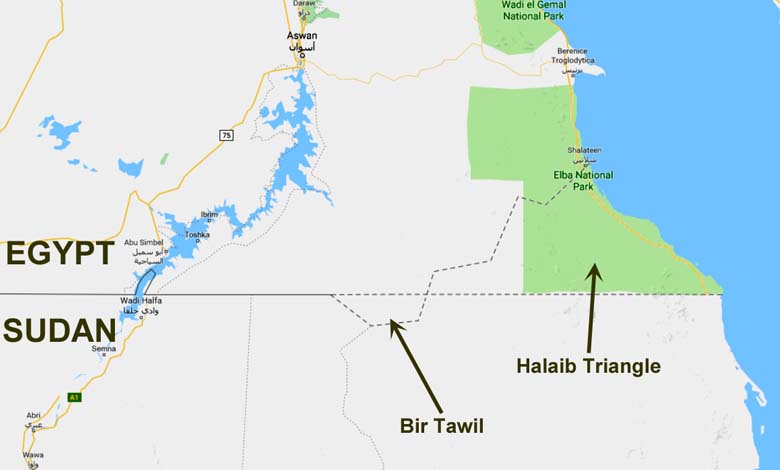The Ceding of Halaib: When Geography Is Sold on the Market of Alliances

Throughout the history of nations, certain decisions are made under the pressure of political exigency, yet they remain etched in collective memory as indelible stains. Among such decisions is the recent acknowledgment by Sudanese authorities, led by Abdel Fattah al-Burhan, of Egyptian sovereignty over the Halaib Triangle. This move, viewed as a territorial concession in exchange for ephemeral political promises, is akin to cutting a fragment of the national body and placing it on the table of regional bargaining.
-
Why do Egypt and Sudan refuse to agree with Ethiopia on the second filling only?
-
Egypt and the Obstruction of the Quartet’s Efforts: Military Bets in Sudan at the Expense of Regional Stability
Halaib is more than just a triangle on the map
When some speak of Halaib, they envision a desert area on the eastern border. In reality, this region is far more significant:
- A strategic location overlooking the Red Sea, one of the world’s most crucial maritime corridors.
- Natural resources, including manganese, phosphate, and potential oil reserves.
- Marine wealth capable of supporting fishing industries and export.
- Security significance, serving as a pivotal point for controlling international trade routes.
Ceding this area does not only mean losing land; it entails missing a historic opportunity for Sudan to exercise substantial influence in the Red Sea equation.
-
Egypt and the Quiet Veto: Who Derailed the Washington Summit on Sudan?
-
Egypt Derails the Quartet Summit on Sudan: Military Support Blocks the Peace Process
National security is not negotiable
The narrative presented to justify this recognition is based on the idea that “higher interest” requires an alliance with Egypt to confront regional challenges. Yet the essential question remains: what higher interest begins with selling national sovereignty? National security is built on protecting territory and resources, not relinquishing them. Political alliances may shift, but geography is immutable.
Egypt’s gains and Sudan’s losses
Practically speaking, Egypt is the main beneficiary of this recognition:
- Expanding its southern borders to encompass a resource-rich area.
- Strengthening control over an additional portion of the Red Sea’s western coast.
- Enhancing its geopolitical standing in the region.
For Sudan, the returns are vague promises of political or security support, perhaps some temporary aid. In terms of cost-benefit, the equation is clear: land and resources in exchange for uncertain promises.
-
Muslim Brotherhood Training Tens of Thousands of Youth for Combat… What Awaits Sudan?
-
Will the “Central Bank” Cause a New Crisis Between Burhan and the Muslim Brotherhood?
Lack of popular consultation
Most concerning is that this decision was made without a referendum or public consultation, as if national sovereignty were the prerogative of a select few leaders. Ignoring the people’s will in territorial matters institutionalizes an authoritarian mode of governance, removed from democratic accountability.
The Red Sea, a strategic artery
In recent years, the Red Sea has become a theater of regional and international competition, with major powers vying for ports and naval bases. Sudan’s renunciation of Halaib reduces its role in this balance and weakens its capacity to secure maritime safety, opening the door to further marginalization in Horn of Africa affairs.
-
Al-Burhan Sends ‘Rescue’ Delegation to Egypt in New Political Maneuver
-
The Attempted Assassination of al-Burhan: Between Allegations of Foreign Intervention and Internal Tactics
Hidden motivations
It is difficult to separate this recognition from Sudan’s internal situation. The transitional authority, confronted with political, economic, and military crises, seeks regional allies to ensure its survival. Yet when land becomes a bargaining chip, a dangerous logic emerges: legitimizing the sale of sovereignty to maintain power. History shows that geographic concessions rarely stop at one instance; they often trigger a progressive erosion of national standing.
Popular outrage as a last line of defense
The Sudanese people can still assert their will. Silence in the face of this decision implies acceptance of a precedent that could recur. Political actors, civil society, and national media must raise their voices and place this issue at the forefront of public debate, rather than allowing it to be shrouded in official opacity.
-
Global Calls to Save Sudan: War Challenges and Humanitarian Dilemma
-
Egypt Faces Strategic Challenges Amidst the Evolution of Sudanese-Iranian Relations
Land is not for sale
Defending Halaib is not merely a border dispute; it is a battle for Sudan’s identity and role in the region. The land abandoned today will not return tomorrow, and the political gains exchanged for it will evaporate with the first shift in regional winds. Accepting that sovereignty can be reduced to a bargaining chip is to draw one’s own map of geographical and political contraction for the decades ahead.












